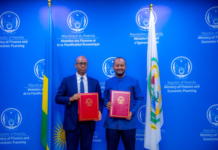Project to increase crop yield in Kenya has been launched at Egerton University in Nakuru County. A multi-agency team has been formed to fight soil acidity which reduces maize production on small- scale farms, raising food insecurity.
The United States Agency for International Development (USAID) through the ‘Feed the Future Advancing Local Leadership, Innovation and Networks (ALL-IN)’ programme has launched the effort which will be implemented by the University’s Tegemeo Institute of Agricultural Policy and Development to counteract soil acidity which cuts maize yields by at least 30%.
The project’s Lead Principal Investigator and a research fellow at Tegemeo Institute of Agricultural Policy and Development Dr John Olwande said the initiative would involve over 4,000 farmers in counties of Bungoma, Kakamega, Trans Nzoia, and Uasin Gishu which were among the most important for maize production areas in Kenya.
“These counties are among those in which the government conducted soil tests in 2014 and found that the soils were highly acidic. The project’s goal is to address the high cost of soil management by involving stakeholders in the entire value chain of fertilizers and lime,” Dr Olwande said.
Appropriate soil management practices
The Investigator indicated that the project would bring on board experts and stakeholders to build evidence on practical ways to encourage farmers to update their knowledge about the condition of their soils and encourage them to apply appropriate soil management practices.
Dr Olwande was flanked by co-director of ‘Feed the Future Advancing Local Leadership, Innovation and Networks (ALL-IN)’ Dr David Sarfo Ameyaw and Director of the ‘Feed the Future Innovation Lab for Markets, Risk and Resilience’ Dr Michael Carter. He stated that the project planned to engage financial institutions, farmers, agricultural experts and community actors to revitalize soils and improve yields in the region.
“Few small-scale farmers test their soils to make soil management decisions. The project will support efforts by the government, development agencies, and private sector investors in promoting and facilitating proper soil management among farmers for sustainable agricultural productivity growth. This effort will get lime, inorganic and organic fertilizers and conservation agriculture to smallholder farmers who at present can only produce enough food to last three months, the other nine months becoming a long hungry season,” said Dr Olwande.
The project is expected to bring together researchers, financial institutions, lime and fertilizer companies, agro-dealers, civil society organizations, extension workers, and smallholder farmers to plan ways of implementing measures aimed at solving this problem.









[…] Source link […]
Comments are closed.